
Frontiers in Materials
Scope & Guideline
Empowering Knowledge Exchange in Materials Science.
Introduction
Aims and Scopes
- Materials for Energy Applications:
Research focused on materials that enhance energy conversion and storage, including solar cells, batteries, and fuel cells. - Smart and Functional Materials:
Development of materials with responsive properties for applications in sensors, actuators, and wearable technology. - Nanotechnology and Nanomaterials:
Exploration of nanoscale materials and their unique properties for applications in electronics, photonics, and biomedicine. - Sustainable and Green Materials:
Investigations into eco-friendly materials, recycling processes, and the use of waste materials in construction and manufacturing. - Biomedical Materials:
Research on materials designed for medical applications including drug delivery systems, implants, and tissue engineering. - Composite Materials:
Studies on the design, fabrication, and mechanical properties of composite materials for structural applications. - Advanced Characterization Techniques:
Utilization of innovative characterization methods to understand the microstructural and mechanical properties of materials. - Computational Materials Science:
Application of computational methods and machine learning to predict material behavior and optimize material design.
Trending and Emerging
- Machine Learning in Materials Science:
An increasing trend towards the application of machine learning algorithms for predicting material properties and optimizing designs. - Biomaterials and Tissue Engineering:
Growing interest in the development of bioactive materials for regenerative medicine and tissue engineering applications. - Recycling and Waste Utilization:
Research focusing on the recycling of materials and the development of sustainable materials from waste products. - Hybrid and Composite Materials:
A surge in studies on hybrid materials that combine different functionalities and properties for advanced applications. - Nanostructured Materials for Energy Applications:
Heightened focus on nanomaterials for enhancing energy storage and conversion technologies. - Smart and Multifunctional Materials:
Emerging research on materials that can adapt their properties in response to environmental stimuli. - Durability and Long-Term Performance Studies:
Increased emphasis on the long-term performance and durability of materials in real-world applications.
Declining or Waning
- Traditional Materials Science:
Research focusing solely on conventional materials without innovative applications or enhancements is becoming less prominent. - Basic Characterization Studies:
Papers that primarily describe materials without advancing their applications or functional properties are decreasing. - Single-Component Systems:
Research on single-material systems is waning as interest shifts towards multi-material and composite approaches. - Low-Tech Applications:
Studies that do not incorporate modern techniques or address contemporary challenges in materials science are less frequently published. - Theoretical Studies Without Experimental Validation:
Theoretical papers lacking experimental support are receiving less emphasis, as the field increasingly values practical applications.
Similar Journals
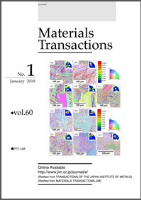
MATERIALS TRANSACTIONS
Advancing the Frontiers of Material ScienceMATERIALS TRANSACTIONS, published by the Japan Institute of Metals & Materials, stands as a pivotal journal in the fields of Condensed Matter Physics, Materials Science, and Mechanical Engineering. Operating since 1993, this peer-reviewed journal aims to disseminate high-quality research that advances our understanding of material properties and behaviors under varied conditions. With an ISSN of 1345-9678 and an E-ISSN of 1347-5320, it provides open access options, ensuring that the latest findings are readily available to a global audience. The journal currently holds a commendable Q3 ranking across multiple categories, underscoring its relevance and impact in the respective fields. Located in Sendai, Japan, MATERIALS TRANSACTIONS has emerged as a vital resource for researchers, professionals, and students alike, fostering innovation and collaboration in material science and engineering methodologies. As the demand for advanced materials continues to rise, this journal serves as an essential platform for sharing and discussing cutting-edge research and developments.
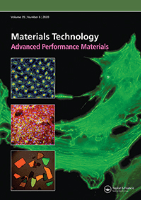
MATERIALS TECHNOLOGY
Advancing the Frontiers of Materials ScienceMATERIALS TECHNOLOGY is a prestigious academic journal published by Taylor & Francis Ltd, based in the United Kingdom. With an ISSN of 1066-7857 and an E-ISSN of 1753-5557, this journal has established itself as a vital resource in the fields of Condensed Matter Physics, Materials Science, Mechanical Engineering, and Mechanics of Materials, earning a Q2 ranking in multiple categories as of 2023. With a rich publication history that dates back to the early 1970s, it serves as an essential platform for disseminating innovative research and developments in materials technology. Although not available through Open Access, the journal continues to attract contributions from leading researchers, ensuring high-quality articles that advance knowledge in the materials domain. The journal's commitment to excellence is reflected in its notable Scopus rankings, placing it within the 70th to 78th percentiles across several engineering and physics categories. As a vital resource for researchers, professionals, and students alike, MATERIALS TECHNOLOGY plays a critical role in shaping the future of materials science and engineering.

ADVANCED MATERIALS
Shaping Tomorrow's Technologies through Advanced MaterialsAdvanced Materials, published by Wiley-VCH Verlag GmbH, is a premier academic journal that serves as a crucial platform for cutting-edge research in the field of materials science and engineering. With an impressive impact factor and ranking among the top tiers in various categories, including Materials Science, Mechanical Engineering, and Nanoscience, this journal is recognized for its high-quality contributions and relevance to contemporary research challenges. Spanning from 1989 to 2024, Advanced Materials not only features groundbreaking studies but also provides insights into innovative applications and advancements in material design and engineering. Researchers, professionals, and students alike will benefit from the rigorous peer-review process and diverse range of topics covered, making it an indispensable resource for those aiming to stay at the forefront of materials science innovation.

SmartMat
Unlocking the Potential of Smart Materials for Global Impact.SmartMat is a cutting-edge, peer-reviewed academic journal published by WILEY, dedicated to the fields of Chemistry, Materials Science, and Mechanics of Materials. Launched in 2020, this Open Access journal aims to disseminate high-quality research and innovative findings that bridge these interdisciplinary areas. With an impressive impact factor reflecting its strong scholarly influence, SmartMat currently holds the prestigious Q1 category ranking in key domains such as Chemistry (miscellaneous), Materials Science (miscellaneous), and Mechanics of Materials, underscoring its relevance and importance in advancing material research. The journal is ranked among the top in its fields on Scopus, with 98th and 97th percentiles for Engineering and Chemistry rankings, respectively. Researchers, professionals, and students looking for a platform to share advancements in smart materials and their applications are encouraged to explore the wide-ranging access options available, enhancing visibility and engagement with global scientific communities.

Journal of Ovonic Research
Bridging Theory and Application in Material Technologies.Journal of Ovonic Research is a distinguished publication dedicated to advancing the fields of electronic, optical, and magnetic materials. Published by VIRTUAL CO PHYSICS SRL, this journal offers a platform for researchers to share innovative findings and developments that push the boundaries of technology and materials science. With an ISSN of 1842-2403 and an E-ISSN of 1584-9953, it provides an important service to the academic community, particularly within Romania and beyond. Despite its recent inception in 2011, the journal has gained traction in the academic landscape, reflecting a Q4 quartile ranking in crucial categories such as Electronic, Optical and Magnetic Materials, as well as in Physics and Astronomy. The Scopus rankings further underscore its positioning, ranking within the 25th to 37th percentile across various disciplines, making it a valuable resource for professionals and students alike. Although the journal currently operates on a non-open access basis, it remains committed to exploring the latest advancements in materials science, encouraging interdisciplinary collaboration and fostering a deeper understanding of surface, coating, and film technologies. As the field evolves, Journal of Ovonic Research stands as a beacon for scholarly communication, bridging the gap between research and practical application.
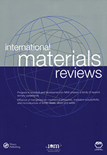
INTERNATIONAL MATERIALS REVIEWS
Your Gateway to Cutting-Edge Materials ReviewsINTERNATIONAL MATERIALS REVIEWS, published by SAGE Publications Inc, is a leading journal dedicated to the comprehensive analysis of contemporary research in the fields of materials chemistry, mechanical engineering, mechanics of materials, and the study of metals and alloys. With an impressive impact factor and a Q1 ranking across multiple categories such as Materials Chemistry and Mechanical Engineering in 2023, it ranks amongst the top journals for innovative materials research. The journal has a long-standing history since its inception in 1987 and continues to serve as a crucial resource for academics and professionals alike. Although it is not open access, it is renowned for its rigorous peer-review process and its commitment to disseminating high-quality materials science research globally. Researchers, students, and industry professionals benefit greatly from the journal's insightful reviews, both for the advancement of theoretical knowledge and practical applications within the fast-evolving materials field.

AIMS Materials Science
Fostering Global Collaboration in Material StudiesAIMS Materials Science is an esteemed open-access journal dedicated to advancing the field of materials science. Published by the American Institute of Mathematical Sciences (AIMS), this journal has been a vital resource for researchers, professionals, and students since its inception in 2014. With an ISSN of 2372-0468 and an E-ISSN of 2372-0484, it focuses on disseminating high-quality research in materials science, ranging from general materials science to cutting-edge advancements in innovative materials applications. Currently ranked Q3 in the 2023 Scopus Materials Science (miscellaneous) category, with a ranking of 253/463, AIMS Materials Science strives to provide an open forum for scholarly dialogue and collaboration, ensuring valuable insights are accessible to the global scientific community. The journal's commitment to open access enhances its visibility and reach, further promoting impactful research in this dynamic field.
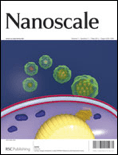
Nanoscale
Elevating Research Standards in Nanotechnology.Nanoscale is a premier academic journal published by the Royal Society of Chemistry, dedicated to advancing the field of nanoscience and nanotechnology. With both its ISSN (2040-3364) and E-ISSN (2040-3372) ensuring wide accessibility, the journal is renowned for its high-impact research contributions, reflected in its impressive 2023 Impact Factor and prestigious Q1 ranking in both Materials Science (Miscellaneous) and Nanoscience and Nanotechnology categories. Since its inception in 2009, Nanoscale has fostered a collaborative platform where leading researchers from around the globe share their innovative findings across a multitude of topics spanning from material synthesis to applications in nanotechnology. The journal not only serves as a valuable resource for professionals, researchers, and students but also actively engages the academic community in discussing emerging trends, thus shaping the future of nanoscience. Situated in the heart of the UK at Thomas Graham House, Science Park, Milton Rd, Cambridge CB4 0WF, Nanoscale remains a key publication for those looking to keep abreast of the latest breakthroughs in an ever-evolving field.
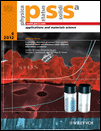
PHYSICA STATUS SOLIDI A-APPLICATIONS AND MATERIALS SCIENCE
Elevating the discourse in materials applications.PHYSICA STATUS SOLIDI A-APPLICATIONS AND MATERIALS SCIENCE, published by WILEY-V C H VERLAG GMBH, stands as a prominent journal in the fields of condensed matter physics, materials science, and engineering. With an ISSN of 1862-6300 and E-ISSN 1862-6319, this journal has been actively contributing to scientific discourse since its inception. The journal currently holds a respectable Q2 ranking across several categories including Electrical and Electronic Engineering and Materials Chemistry, demonstrating its significance in advancing research and development within these domains. Although it does not offer open access, the journal ensures high-quality peer-reviewed content that is critical for researchers and professionals aiming to stay at the forefront of materials science innovations. The journal’s convergence years, extending from 2005 to 2024, reflects its ongoing commitment to publishing impactful research. By facilitating discussions on applications and advances in materials science, PHYSICA STATUS SOLIDI A continues to be an essential resource for those striving to contribute to this dynamic field.

Energy & Environmental Materials
Leading the Charge in Sustainable Material ScienceEnergy & Environmental Materials, published by WILEY, is an esteemed academic journal dedicated to pioneering research in the multifaceted domains of energy, environmental science, and materials science. Since its inception in 2018, this journal has rapidly established itself as a leading platform, holding a prestigious Q1 ranking across multiple categories including Renewable Energy, Sustainability, and Waste Management, reflecting its significant contributions to advancing knowledge in these critical areas. With a robust Scopus ranking that positions it in the top percentile for Environmental Science and Materials Science, it caters to a diverse audience of researchers, professionals, and students seeking cutting-edge findings and practical applications in energy efficiency and sustainable materials. This open-access journal facilitates the dissemination of innovative research and aims to bridge the gap between scientific exploration and real-world solutions for a sustainable future. The editorial team encourages submissions that explore both theoretical and practical aspects, ensuring that every publication not only contributes to the academic landscape but also drives impactful change in energy and environmental practices.